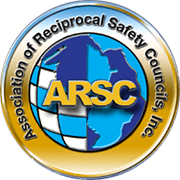By Katie Cerar
Co-Administrator, Association of Reciprocal Safety Councils
The Coronavirus has touched all of us in one way or another. It has called on us to stay home and socially distance ourselves from the ones we love the most. It has affected businesses both big and small and cost others their jobs. The members of the Association of Reciprocal Safety Councils have also been affected. Eighteen of our members had to close their doors at one point during this pandemic, as of May 20th, only seven remain closed. Others have had to alter their hours of operation and use extreme precaution when handling any task. All of the safety councils that are still offering courses are using the best practices to limit the spread of COVID-19. Not only are they utilizing the CDC’s recommendations of washing hands and avoiding close contact, they are also limiting their class sizes and avoiding contact with student’s personal possessions like IDs and paperwork.
Other precautions that are commonly being used are temperature screenings for employees and instructors prior to entering the building. They are also asking employees who have exhibited any cold like symptoms to please stay home. Most of the safety councils have set up hand sanitizer dispensers and others have even added hand washing stations. They are also using sanitizing wipes on commonly touched surfaces and in lap and classroom areas, this occurs hourly or after each use. There are also small practices in place that make big differences. Some of these include having the front door to each council propped open. This limits the need to touch one of the most commonly used surfaces in the lobby. Our members are also using social distancing in multiple areas of their facilities. These areas included the outdoor waiting area, registration lines, and in the labs and classrooms. If available, councils place students six feet apart in their computer labs for the learning or testing process, for smaller labs, class sizes are limited to better fit their lab size.
Due to the pandemic, ARSC’s release of the ProtectWatch program will be delayed. It was originally set to release during the 3rd quarter of 2020. On a more positive note, a handful of the councils that were once closed have already reopened fully or with limited hours of operation, while still implementing the best practices to limit the spread. Other councils have plans to open in the near future when it is safe to do so. Some of our members plan to open and operate during their normal business hours while others are planning on opening certain days of the week for limited hours. You can visit the locations page of our website for a listing of locations offering ARSC training and contact the councils directly for information on their hours of operation.
